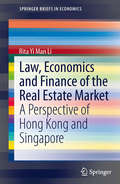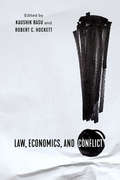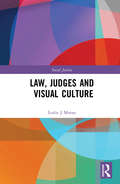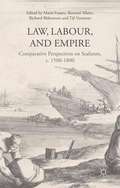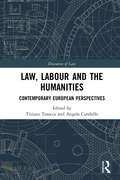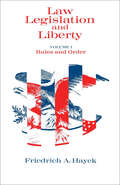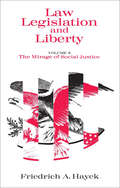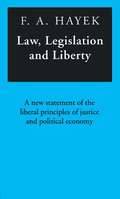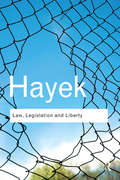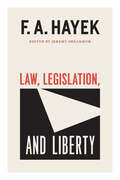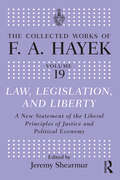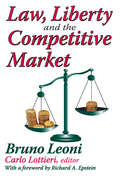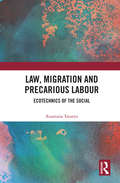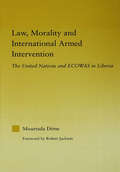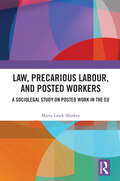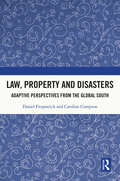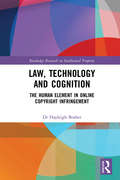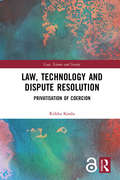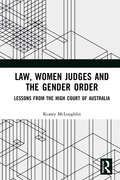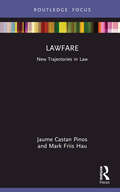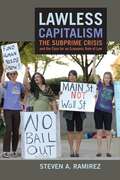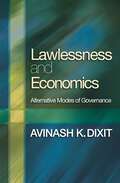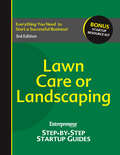- Table View
- List View
Law, Economics and Finance of the Real Estate Market
by Rita Yi Man LiThe symbiosis between the law, economics and finance is evidenced in our daily lives. This book elucidates the relationship between these factors in Singapore and Hong Kong in direct and indirect real estate market. In Singapore, for example, there is an inseparable relationship between law, economics, finance and the HDB market. The book also showcases the concept of invitation to treat and offer, monetary compensation for environmental externalities under the lens of institutional economics. It also sheds light on the relationship between financial crisis, regulations, housing prices and indirect real estate market.
Law, Economics, and Conflict
by Kaushik Basu and Robert C. HockettIn Law, Economics, and Conflict, Kaushik Basu and Robert C. Hockett bring together international experts to offer new perspectives on how to take analytic tools from the realm of academic research out into the real world to address pressing policy questions. As the essays discuss, political polarization, regional conflicts, climate change, and the dramatic technological breakthroughs of the digital age have all left the standard tools of regulation floundering in the twenty-first century. These failures have, in turn, precipitated significant questions about the fundamentals of law and economics.The contributors address law and economics in diverse settings and situations, including central banking and the use of capital controls, fighting corruption in China, rural credit markets in India, pawnshops in the United States, the limitations of antitrust law, and the role of international monetary regimes. Collectively, the essays in Law, Economics, and Conflict rethink how the insights of law and economics can inform policies that provide individuals with the space and means to work, innovate, and prosper—while guiding states and international organization to regulate in ways that limit conflict, reduce national and global inequality, and ensure fairness.Contributors: Kaushik Basu; Kimberly Bolch; University of Oxford; Marieke Bos, Stockholm School of Economics; Susan Payne Carter, US Military Academy at West Point; Peter Cornelisse, Erasmus University Rotterdam; Gaël Giraud, Georgetown University; Nicole Hassoun, Binghamton University; Robert C. Hockett; Karla Hoff, Columbia University and World Bank; Yair Listokin, Yale Law School; Cheryl Long, Xiamen University and Wang Yanan Institute for Study of Economics (WISE); Luis Felipe López-Calva, UN Development Programme; Célestin Monga, Harvard University; Paige Marta Skiba, Vanderbilt Law School; Anand V. Swamy, Williams College; Erik Thorbecke, Cornell University; James Walsh, University of Oxford.Contributors: Kimberly B. Bolch, Marieke Bos, Susan Payne Carter, Peter A. Cornelisse, Gaël Giraud, Nicole Hassoun, Karla Hoff, Yair Listokin, Cheryl Long, Luis F. López-Calva, Célestin Monga, Paige Marta Skiba, Anand V. Swamy, Erik Thorbecke, James Walsh
Law, Judges and Visual Culture (Social Justice)
by Leslie J MoranLaw, Judges and Visual Culture analyses how pictures have been used to make, manage and circulate ideas about the judiciary through a variety of media from the sixteenth century to the present. This book offers a new approach to thinking about and making sense of the important social institution that is the judiciary. In an age in which visual images and celebrity play key roles in the way we produce, communicate and consume ideas about society and its key institutions, this book provides the first in-depth study of visual images of judges in these contexts. It not only examines what appears within the frame of these images; it also explores the impact technologies and the media industries that produce them have upon the way we engage with them, and the experiences and meanings they generate. Drawing upon a wide range of scholarship – including art history, film and television studies, and social and cultural studies, as well as law – and interviews with a variety of practitioners, painters, photographers, television script writers and producers, as well as court communication staff and judges, the book generates new and unique insights into making, managing and viewing pictures of judges. Original and insightful, Law, Judges and Visual Culture will appeal to scholars, postgraduates and undergraduates from a variety of disciplines that hold an interest in the role of visual culture in the production of social justice and its institutions.
Law, Labour and Empire
by Maria Fusaro Bernard Allaire Richard J. Blakemore Tijl VannesteSeafarers were the first workers to inhabit a truly international labour market, a sector of industry which, throughout the early modern period, drove European economic and imperial expansion, technological and scientific development, and cultural and material exchanges around the world. This volume adopts a comparative perspective, presenting current research about maritime labourers across three centuries, in the Mediterranean Sea and the Atlantic and Indian Oceans, to understand how seafarers contributed to legal and economic transformation within Europe and across the world. Focusing on the three related themes of legal systems, labouring conditions, and imperial power, these essays explore the dynamic and reciprocal relationship between seafarers' individual and collective agency, and the social and economic frameworks which structured their lives.
Law, Labour and the Humanities: Contemporary European Perspectives
by Angela Condello Tiziano ToraccaThe ontology of work and the economics of value underpin the legal institution, with the existence of modern law predicated upon the subject as labourer. In contemporary Europe, labour is more than a mere economic relationship. Indeed, labour occupies a central position in human existence: since the industrial revolution, it has been the principal criterion of reciprocal recognition and of universal mobilization. This multi-disciplinary volume analyses labour and its depictions in their interaction with the latest legal, socio-economic, political and artistic tendencies. Addressing such issues as deregulation, flexibility, de-industrialization, the pervasive enlargement of markets, digitization and virtual relationships, social polarisation and migratory fluxes, this volume engages with the existential role played by labour in our lives at the conjunction of law and the humanities. This book will be of interest to law students, legal philosophers, theoretical philosophers, political philosophers, social and political theorists, labour studies scholars, and literature and film scholars.
Law, Legislation and Liberty, Volume 1: Rules and Order (Law, Legislation and Liberty)
by Friedrich A. HayekFrom a Nobel Laureate economist, “after more than half a century, Rules and Order remains an essential book for anybody interested in politics or law” (EconLib).F. A. Hayek made many valuable contributions to the field of economics as well as to the disciplines of philosophy and politics. This volume represents the first section of Hayek’s comprehensive three-part study of the relations between law and liberty. Rules and Order constructs the framework necessary for a critical analysis of prevailing theories of justice and of the conditions which a constitution securing personal liberty would have to satisfy.
Law, Legislation and Liberty, Volume 2: The Mirage of Social Justice (Law, Legislation and Liberty)
by Friedrich A. HayekF. A. Hayek made many valuable contributions to the field of economics as well as to the disciplines of philosophy and politics. This volume represents the second of Hayek's comprehensive three-part study of the relations between law and liberty. Here, Hayek expounds his conviction that he continued unexamined pursuit of "social justice" will contribute to the erosion of personal liberties and encourage the advent of totalitarianism.
Law, Legislation and Liberty: A New Statement of the Liberal Principles of Justice and Political Economy (Routledge Classics Ser.)
by F.A. HayekFirst published in 1982. Routledge is an imprint of Taylor & Francis, an informa company.
Law, Legislation and Liberty: A new statement of the liberal principles of justice and political economy (Routledge Classics)
by F. A. HayekWith a new foreword by Paul Kelly 'I regard Hayek's work as a new opening of the most fundamental debate in the field of political philosophy' – Sir Karl Popper 'This promises to be the crowning work of a scholar who has devoted a lifetime to thinking? about society and its values. The entire work must surely amount to an immense contribution to social and legal philosophy' - Philosophical Studies Law, Legislation and Liberty is Hayek's major statement of political philosophy and one of the most ambitious yet subtle defences of a free market society ever written. A robust defence of individual liberty, it is also crucial for understanding Hayek’s influential views concerning the role of the state: far from being an innocent bystander, he argues that the state has an important role to play in defending the norms and practices of an ordered and free society. His arguments had a profound influence on the policies of Thatcher in the 1980s and resonate today in visions of the ‘Big Society’. First published in three separate volumes, this Routledge Classics edition makes one of his most important books available in a single volume. Essential reading for understanding the background to the recent world economic turmoil and financial crisis, it also foreshadows the subsequent heated debate about regulation and political governance if such disasters are to be avoided in the future.
Law, Legislation, and Liberty, Volume 19: A New Statement Of The Liberal Principles Of Justice And Political Economy (Routledge Classics Ser. #19)
by F.A. HayekA new edition of F. A. Hayek’s three-part opus Law, Legislation, and Liberty, collated in a single volume In this critical entry in the University of Chicago’s Collected Works of F. A. Hayek series, political philosopher Jeremy Shearmur collates Hayek’s three-part study of law and liberty and places Hayek’s writings in careful historical context. Incisive and unrestrained, Law, Legislation, and Liberty is Hayek at his late-life best, making it essential reading for understanding the philosopher’s politics and worldview. These three volumes constitute a scaling up of the framework offered in Hayek’s famed The Road to Serfdom. Volume 1, Rules and Order, espouses the virtues of classical liberalism; Volume 2, The Mirage of Social Justice, examines the societal forces that undermine liberalism and, with it, liberalism’s capacity to induce “spontaneous order”; and Volume 3, The Political Order of a Free People, proposes alternatives and interventions against emerging anti-liberal movements, including a rule of law that resides in stasis with personal freedom. Shearmur’s treatment of this challenging work—including an immersive new introduction, a conversion of Hayek’s copious endnotes to footnotes, corrections to Hayek’s references and quotations, and the provision of translations to material that Hayek cited only in languages other than English—lends it new importance and accessibility. Rendered anew for the next generations of scholars, this revision of Hayek’s Law, Legislation, and Liberty is sure to become the standard.
Law, Legislation, and Liberty: A New Statement of the Liberal Principles of Justice and Political Economy (The Collected Works of F.A. Hayek #19)
by F.A. HayekA new edition of F. A. Hayek’s three-part opus Law, Legislation, and Liberty, collated in a single volume In this critical entry in the Collected Works of F. A. Hayek series, political philosopher Jeremy Shearmur collates Hayek’s three-part study of law and liberty and places Hayek’s writings in careful historical context. Incisive and unrestrained, Law, Legislation, and Liberty is Hayek at his late-life best, making it essential reading for understanding the philosopher’s politics and worldview. These three volumes constitute a scaling up of the framework offered in Hayek’s famed The Road to Serfdom. Volume 1, Rules and Order, espouses the virtues of classical liberalism; Volume 2, The Mirage of Social Justice, examines the societal forces that undermine liberalism and, with it, liberalism’s capacity to induce "spontaneous order"; and Volume 3, The Political Order of a Free People, proposes alternatives and interventions against emerging anti-liberal movements, including a rule of law that resides in stasis with personal freedom. Shearmur’s treatment of this challenging work—including an immersive new introduction, a conversion of Hayek’s copious endnotes to footnotes, corrections to Hayek’s references and quotations, and the provision of translations to material that Hayek cited only in languages other than English—lends it new importance and accessibility. Rendered anew for the next generations of scholars, this revision of Hayek’s Law, Legislation, and Liberty is sure to become the standard.
Law, Liberty and State
by Thomas Poole David Dyzenhaus Dyzenhaus, David and Poole, Thomas"Oakeshott, Hayek and Schmitt are associated with a conservative reaction to the 'progressive' forces of the twentieth century. Each was an acute analyst of the juristic form of the modern state and the relationship of that form to the idea of liberty under a system of public, general law. Hayek had the highest regard for Schmitt's understanding of the rule of law state despite Schmitt's hostility to it, and he owed the distinction he drew in his own work between a purpose-governed form of state and a law-governed form to Oakeshott. However, the three have until now rarely been considered together, something which will be ever more apparent as political theorists, lawyers and theorists of international relations turn to the foundational texts of twentieth-century thought at a time when debate about liberal democratic theory might appear to have run out of steam"--
Law, Liberty, and the Competitive Market
by Bruno Leoni"Law, Liberty, and the Competitive Market" brings the clash between law and legislation to the attention of economists and political scientists. It fills a void and offers a series of texts that have not previously been translated into English. This anthology connects various articles by Leoni on economics and law with the objective of emphasizing how much Leoni's own theory in the juridical environment was influenced by reflection on authors of the Austrian school - from Carl Menger to Ludwig von Mises, from Friedrich von Hayek to Murray N. Rothbard.The essays dealing with economics help us understand how many of Leoni's positions were libertarian. A careful reader of Mises, Leoni often ends up by assuming positions that are even more anti-state than those of the Austrian economist (concerning monopolies, for example). It is significant that in the 1960s his thought was influenced by Rothbard. The very critiques that he addresses to normativism and to analytical philosophy contain strong ideological elements, as they move from the awareness that legal positivism leads to statism and philosophical relativism to acquiescence in the face of power.Studying the market economy, Leoni perceives opposition between spontaneous order and planning. In this way, he understands how such a contrast is significant for the origins of norms. Leoni's idea of a law able to protect individual liberty has its roots in the market. Thus, the market is at the same time the model he uses to conceive the legal order and an institution fundamental for the service of civilization, which the law is called to protect. This is an important work by a figure only now being recognized as a pioneer in the field of economics and an innovator in political theory.
Law, Migration and Precarious Labour: Ecotechnics of the Social
by Anastasia TatarynProviding a radical new approach to labour migration, this book challenges the prevailing legal and political construction of the figure of the irregular migrant labourer, whilst at the same time reimagining this irregularity as the basis of an alternative, post-capitalist, sociality. The text draws on the work of contemporary philosopher Jean-Luc Nancy, and more specifically his term ‘ecotechnics’, in order to examine how economic, political, and juridical norms deny the full legal status of certain people who are deemed to be irregular. This ostensible irregularity is revealed as a regular feature of labour market practice, and a necessary support for the conceptual foundations of capitalist legality. As this book shows, however, this legality – and with it, the technological subordination of life to the circulation of capital as if this were the only possibility for our being in the world – is not insurmountable. The book’s consideration of the figure of the irregular migrant labourer comes to provide an alternative basis for reimagining our relationship not only with migration and with labour itself, but ultimately with each other. This powerful analysis of contemporary labour migration is of considerable interest to legal and political theorists, philosophers, labour lawyers, migration experts, and others with theoretical, political, or policy interests in this area.
Law, Morality, and International Armed Intervention: The United Nations and ECOWAS (African Studies)
by Mourtada DemeInternational law is often manipulated in the debate about humanitarian intervention. The Liberian case provides an opportunity to challenge the UN and The Economic Community of West African States' (ECOWAS') new approach. ECOWAS and the UN's justifications for moving away from the current norms are flawed. No enlightened person would disagree with the values of peace, democracy, human rights, and economic development. This book, however, explores whether these goals be pursued within the current framework or outside it.
Law, Precarious Labour and Posted Workers: A Sociolegal Study on Posted Work in the EU
by Marta Lasek-MarkeyThis book examines the role of law in regulating and influencing the lived experiences of posted workers in Europe. The ‘posting’ of workers is an unusual type of labour mobility, where workers are hired out to provide a specific service in another country. Although it involves a specialised area of law, it is one that serves as a magnifying glass for the long-standing tension between the economic and social dimensions of law’s regulatory role. As an atypical form of labour migration, posting also touches upon broader themes concerning the role and purpose of labour law in a changing world of work. Taking up these themes through interviews with posted workers, lawyers and employers, the book adopts a sociolegal approach to consider how the law shapes the precarious lived experiences of posted workers in Europe. Giving voice to those with first-hand experience, the book goes on to propose solutions that might address the precarity of posted work. This book will be of interest to scholars, researchers and practitioners working in the areas of labour law, sociolegal studies, EU law, and migration.
Law, Property and Disasters: Adaptive Perspectives from the Global South
by Daniel Fitzpatrick Caroline ComptonThis book re-considers property law for a future of environmental disruption. As slogans such as “build the wall” or “stop the boats” affect public policy, there are counter-questions as to whether positivist or statist notions of property are fit for purpose in a time of human mobility and environmental disruption. State-centric property laws construct legal fictions of sovereign control over land, notwithstanding the persistent reality of informal settlements in many parts of the Global South. In a world affected by catastrophic disasters, this book develops a vision of adaptive governance for property in land based on a critical re-assessment of state-centric property law. This book will appeal to a broad readership with interests in legal theory, property law, adaptive governance, international development, refugee studies, postcolonial studies, and natural disasters.
Law, Technology and Cognition: The Human Element in Online Copyright Infringement (Routledge Research in Intellectual Property)
by Hayleigh BosherThis book considers a new approach to online copyright infringement. Rather than looking at the subject within a purely technological context, it provides legal analysis from a human perspective. This book highlights that there are three key instances in which the capacity of a human mind intersects with the development of copyright regulation: (1) the development of copyright statutory law; (2) the interpretation of the copyright statutory law the judiciary; and (3) human interaction with new technology. Using a novel framework for constructing digital perspectives, the author, Dr Hayleigh Bosher, analyses the laws relating to online copyright infringement. She provides insights into why the law appears as it does, shedding light on the circumstances of how it came to pass and demonstrates a clear malfunction in the interpretation and application of copyright law to online activities that derives from the disconnect between the technological and the human perspectives. The book proposes putting the human element back into copyright analysis to enable the return of reason where it has been lost, and provide a clearer, more consistent and fair legal regulation of online copyright infringement. Law, Technology and Cognition: The Human Element in Online Copyright Infringement will be of interest to students, academics, researchers, as well as practitioners.
Law, Technology and Dispute Resolution: The Privatisation of Coercion (Law, Science and Society)
by Riikka KouluThe use of new information and communication technologies both inside the courts and in private online dispute resolution services is quickly changing everyday conflict management. However, the implications of the increasingly disruptive role of technology in dispute resolution remain largely undiscussed. In this book, assistant professor of law and digitalisation Riikka Koulu examines the multifaceted phenomenon of dispute resolution technology, focusing specifically on private enforcement, which modern technology enables on an unforeseen scale. The increase in private enforcement confounds legal structures and challenges the nation-state’s monopoly on violence. And, in this respect, the author argues that the technology-driven privatisation of enforcement – from direct enforcement of e-commerce platforms to self-executing smart contracts in the blockchain – brings the ethics of law’s coercive nature out into the open. This development constitutes a new, and dangerous, grey area of conflict management, which calls for transparency and public debate on the ethical implications of dispute resolution technology.
Law, Women Judges and the Gender Order: Lessons from the High Court of Australia
by Kcasey McLoughlinThis book seeks to understand how women judges are situated as legal knowers on the High Court of Australia by asking whether a near-equal gender balance on the High Court has disrupted the Court’s historically masculinist gender regime. This book examines how the High Court’s gender regime operates once there is more than one woman on the bench. It explores the following questions: How have the Court’s gender relations accommodated the presence women on the bench? How have the women themselves accommodated those pre-existing gender relations? How might legal judgments and reasoning change as a result of changing gender dynamics on the bench? To develop answers to these (and other) questions the book pursues a methodology that conceptualises the High Court as an institution with a particular gender regime shaped historically by the dominant gender order of the wider society. The intersection between the (gendered) individuals and the (gendered) institution in which they operate produces and reproduces that institution’s gender regime. Hence, the enquiry is not so much asking ‘have women judges made a difference?’ but rather is asking how should we understand women judges’ relationship with the law, a relationship that is shaped as much by the individual judge as by the institutional context in which they operate. Scholars, legal practitioners and researchers interested in judicial reasoning, gender diversity and the legal profession, gender and politics will be interested in this book because it breaks new ground as a case study of a Court’s gender regime at a particular time.
Lawfare: New Trajectories in Law (New Trajectories in Law)
by Jaume Castan Pinos Mark Friis HauThis book develops a new conceptualisation of lawfare that recognises the polysemantic nature of the term. Drawing on theoretical developments from legal anthropology, international relations, and social theory, the book scrutinises the multiple dimensions of this phenomenon. It illustrates the multifaceted character of lawfare with a wide range of historical and contemporary cases from across the globe and analyses the implications of actors pursuing political objectives through legal means. This includes the use of lawfare by states as a legal instrument to accomplish geopolitical objectives, domestic lawfare, or the use of legal instruments to undermine internal opposition, and state lawfare used by governments to ‘protect’ the state from internal territorial-secessionist challenges. Finally, the book shows that lawfare is not exclusively a tool for hegemonic actors, as it can also be used by civil society actors that aim to uphold their rights through legal instruments in asymmetric lawfare. This book contributes to new developments in lawfare without shying away from controversy, acknowledging its sometimes-brutal efficacy as well as its potential pitfalls. The book will appeal to scholars and students of law, international relations, political science, anthropology, and sociology.
Lawless Capitalism: The Subprime Crisis and the Case for an Economic Rule of Law
by Steven A. RamirezInthis innovative and exhaustive study, Steven A. Ramirez posits that thesubprime mortgage crisis, as well as the global macroeconomic catastrophe itspawned, is traceable to a gross failure of law.Therule of law must appropriately channel and constrain the exercise of economicand political power. Used effectively, it ensures that economic opportunityisn’t limited to a small group of elites that enjoy growth at the expense ofmany, particularly those in vulnerable economic situations. In Lawless Capitalism, Ramirez calls forthe rule of law to displace cronycapitalism. Only through the rule of law, he argues, can capitalism bereconstructed.
Lawlessness and Economics: Alternative Modes of Governance (The Gorman Lectures in Economics #1)
by Avinash K. DixitHow can property rights be protected and contracts be enforced in countries where the rule of law is ineffective or absent? How can firms from advanced market economies do business in such circumstances? In Lawlessness and Economics, Avinash Dixit examines the theory of private institutions that transcend or supplement weak economic governance from the state. In much of the world and through much of history, private mechanisms--such as long-term relationships, arbitration, social networks to disseminate information and norms to impose sanctions, and for-profit enforcement services--have grown up in place of formal, state-governed institutions. Even in countries with strong legal systems, many of these mechanisms continue under the shadow of the law. Numerous case studies and empirical investigations have demonstrated the variety, importance, and merits, and drawbacks of such institutions. This book builds on these studies and constructs a toolkit of theoretical models to analyze them. The models shed new conceptual light on the different modes of governance, and deepen our understanding of the interaction of the alternative institutions with each other and with the government's law. For example, one model explains the limit on the size of social networks and illuminates problems in the transition to more formal legal systems as economies grow beyond this limit. Other models explain why for-profit enforcement is inefficient. The models also help us understand why state law dovetails with some non-state institutions and collides with others. This can help less-developed countries and transition economies devise better processes for the introduction or reform of their formal legal systems.
Lawn Care or Landscaping
by Entrepreneur MagazineLike working outdoors? Love nature? Then a lawn care or landscaping business is your chance to rake in plenty of green, while doing something you enjoy. Whether it's just picking up a few residential yards to make some extra money, or contracting with commercial office parks or apartments for the big bucks, you can quickly be on your way to earning the income you desire.Our guide is packed with practical, real-world instruction, tips and insider secrets for starting a lawn care or landscaping service. We'll help you choose which business is best for you and walk you step-by-step through everything you need to know to get started and start reaping the rewards, including:How to target your marketWhat equipment you'll needHow to hire and manage employeesRecord-keeping and accountingWhere to find working capitalHow to estimate jobsAnd moreYou'll also get pointers and words of wisdom from successful lawn care and landscaping business owners who've made their personal dreams of prospering in a business they love come true.Startup costs are relatively low and there's practically no overhead. You can set up your office in your own home and make your own schedule--you devote as little or as much time to the business as you'd like. And once you invest in the necessary tools of the trade, you're ready to go! Order your guide today, and start reaping the rewards.The First Three YearsIn addition to industry specific information, you'll also tap into Entrepreneur's more than 30 years of small business expertise via the 2nd section of the guide - Start Your Own Business. SYOB offers critical startup essentials and a current, comprehensive view of what it takes to survive the crucial first three years, giving your exactly what you need to survive and succeed. Plus, you'll get advice and insight from experts and practicing entrepreneurs, all offering common-sense approaches and solutions to a wide range of challenges. Pin point your target market Uncover creative financing for startup and growth Use online resources to streamline your business plan Learn the secrets of successful marketing Discover digital and social media tools and how to use them Take advantage of hundreds of resources Receive vital forms, worksheets and checklists From startup to retirement, millions of entrepreneurs and small business owners have trusted Entrepreneur to point them in the right direction. We'll teach you the secrets of the winners, and give you exactly what you need to lay the groundwork for success.BONUS: Entrepreneur's Startup Resource Kit!Every small business is unique. Therefore, it's essential to have tools that are customizable depending on your business's needs. That's why with Entrepreneur is also offering you access to our Startup Resource Kit. Get instant access to thousands of business letters, sales letters, sample documents and more - all at your fingertips!You'll find the following:The Small Business Legal ToolkitWhen your business dreams go from idea to reality, you're suddenly faced with laws and regulations governing nearly every move you make. Learn how to stay in compliance and protect your business from legal action. In this essential toolkit, you'll get answers to the "how do I get started?" questions every business owner faces along with a thorough understanding of the legal and tax requirements of your business.Sample Business Letters1000+ customizable business letters covering each type of written business communication you're likelyto encounter as you communicate with customers, suppliers, employees, and others. Plus a complete guide to business communication that covers every question you may have about developing your own business communication style.Sample Sales LettersThe experts at Entrepreneur have compliled more than 1000 of the most effective sales letters covering introductions, prospecting, setting up appointments, cover letters, proposal letters, the all-important follow-up letter and letters covering all aspects of sales operations to help you make the sale, generate new customers and huge profits.
